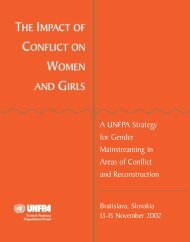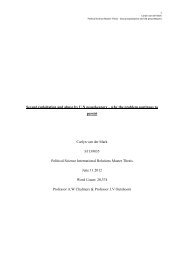Stop Sudah English-revised-March2012 - International Center for ...
Stop Sudah English-revised-March2012 - International Center for ...
Stop Sudah English-revised-March2012 - International Center for ...
You also want an ePaper? Increase the reach of your titles
YUMPU automatically turns print PDFs into web optimized ePapers that Google loves.
Papua in general, or the problem of violence against women in particular. In this context of<br />
exceptional conflict and marginalization, the state has an obligation to protect those who are vulnerable,<br />
but instead ignores the issue of violence that is raging in Papua, and experienced in particular by Papua<br />
women. Up to now there has not been any serious handling of cases of state violence experienced by<br />
women, not one case has ever been investigated, no sanctions imposed on perpetrators, and no trials.<br />
For domestic violence, although there is the Domestic Violence Act at the national level, there is no<br />
clear policy implementation to protect women victims of violence in Papua. There are currently no state<br />
ef<strong>for</strong>ts to provide protection to victims of violence, either to protect victims in crisis situations or to<br />
protect their broader rights. Police are still reluctant to deal with cases of domestic violence. It cannot be<br />
denied that the two <strong>for</strong>ms of violence against women, state violence and domestic violence are<br />
interrelated. Impunity and permitting domestic violence have an impact on state violence, and vice versa.<br />
In essence, the root of the problem is one, namely discrimination against women. Without ef<strong>for</strong>ts to<br />
change the culture and laws, both written and in practice, violence against women will continue. The<br />
protection and promotion of women’s human rights in Papua needs to happen immediately through the<br />
implementation of national legislation, the creation of special provincial legislation, <strong>for</strong>mation and<br />
support <strong>for</strong> safe houses <strong>for</strong> abused women, as well as the deployment of various mechanisms of the<br />
state, religious institutions, and culture at the local, national, and international levels to prevent and stop<br />
violence against women.<br />
5. Overlapping layers of trauma and powerlessness that are not addressed give rise to a cycle of<br />
victimization. Women and girls have experienced mental suffering, fear, feelings of helplessness, lack<br />
of self-confidence, depression and prolonged stress during security operations, during inter-tribal<br />
violence, and in situations of domestic violence. As a result of multiple trauma, women experience<br />
psycho-social pressures that make it increasingly difficult <strong>for</strong> them in terms of economic empowerment,<br />
and access to education and in<strong>for</strong>mation. It is also increasingly difficult <strong>for</strong> them to make decisions <strong>for</strong><br />
themselves or protect themselves from repetitive social problems, such as a husband who likes to get<br />
drunk, the problem of polygamy and infidelity, and the spread of HIV/AIDS. When a woman must<br />
become a single parent, or a daughter loses her parents due to violence or the HIV/AIDS epidemic, it<br />
becomes easier <strong>for</strong> women to fall into a cycle of suffering that increasingly oppresses them.<br />
In the name of humanity and human rights, violence against Papuan women in Papua should not be<br />
allowed to continue.<br />
2. What Must be Done Immediately to <strong>Stop</strong> Violence Against Papuan Women?<br />
Based on the voices of women victims of violence that have been heard and collected in this report, we<br />
make the following recommendations:<br />
To demonstrate its political will, the central government mobilizes resources and takes action to:<br />
• review security policies and implementation in Papua, including reducing the number of troops<br />
deployed, preventing violence against civil society and women, punishing and dismissing perpetrators<br />
of human rights violations, and removing the stigma of ‘separatist,’ ‘traitor,’ and ‘subversive’ from<br />
those who work <strong>for</strong> the fulfillment of human rights and women’s rights in Papua.<br />
• implement Law No. 21 of 2001 in accordance with the spirit of the articles of the law, and with<br />
political will, especially in per<strong>for</strong>ming the obligation to reveal the truth and acknowledge that the<br />
people of Papua in general, and women of Papua in particular have suffered state violence.<br />
• conduct fair, peaceful, and democratic dialogue with the people of Papua as a process that has been<br />
and continues to be driven by some components of society, and ensure that at least 30% of the<br />
dialogue participants are women.<br />
• establish a Human Rights Court and Truth and Reconciliation Commission in Papua according to the<br />
ENOUGH IS ENOUGH! 53




![IANSA [PDF, 2MB] - PeaceWomen](https://img.yumpu.com/25206379/1/190x123/iansa-pdf-2mb-peacewomen.jpg?quality=85)
![Commitments Sample [PDF, 93KB] - PeaceWomen](https://img.yumpu.com/25206331/1/190x245/commitments-sample-pdf-93kb-peacewomen.jpg?quality=85)










![A Toolkit for Advocacy and Action [PDF, 260KB] - Peace Women](https://img.yumpu.com/25205989/1/190x245/a-toolkit-for-advocacy-and-action-pdf-260kb-peace-women.jpg?quality=85)